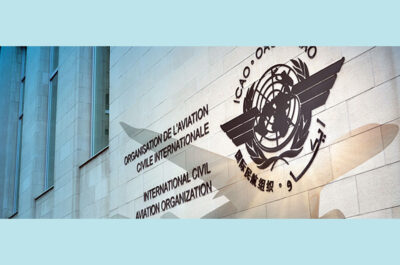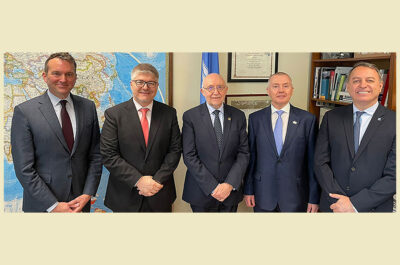The UN aviation agency urges States to implement relevant provisions of Annex 9–Facilitation to the Chicago Convention, to act on formalizing their membership in ICAO’s Collaborative Arrangement for the Prevention and Management of Public Health Events in Civil Aviation (CAPSCA), to effectively establish a National Air Transport Facilitation Committee, and to clarify the roles and responsibilities of public health and civil aviation authorities during outbreaks, in order to support the continuous, safe, and orderly operation of global air services.
MONTREAL – The International Civil Aviation Organization (ICAO) has conveyed new advice to its Member States urging them to review and implement applicable civil aviation standards and recommended practices relevant to communicable disease response.
It also reminded national governments of the publicly and globally accessible COVID-19 online travel and health advisories which have been issued relevant to the outbreak by ICAO, the World Health Organization (WHO), the U.S. Centers for Disease Control (CDC), and other aviation and international organizations.
In its most recent State letter, the UN aviation agency urges States to implement relevant provisions of Annex 9–Facilitation to the Chicago Convention, to act on formalizing their membership in ICAO’s Collaborative Arrangement for the Prevention and Management of Public Health Events in Civil Aviation (CAPSCA), to effectively establish a National Air Transport Facilitation Committee, and to clarify the roles and responsibilities of public health and civil aviation authorities during outbreaks, in order to support the continuous, safe, and orderly operation of global air services.
“We’re urging ICAO’s Member States to collaborate and coordinate on their national and regional preparedness and responses, and also to consider providing financial or in-kind support to the CAPSCA programme, including through the secondment of personnel, so that it can enhance its effectiveness in these scenarios,” commented ICAO Secretary General Dr. Fang Liu. “Increased financing is critical to the sustainability of this key global health and travel coordination mechanism relevant to contagious outbreaks.”
“The COVID-19 outbreak and its impact on airports’ operations globally, underpin the important role of public health authorities at air borders, and the need for an effective national policy framework on air transport facilitation to establish clear roles and responsibilities of the various ministries, agencies and organizations involved with or responsible for air transport facilitation,” Dr. Liu said.
The ICAO State letter also called on its member States to strengthen their preparedness plans for managing risks relating to communicable disease outbreaks by implementing effective collaboration and coordination strategies with all stakeholders, drew government attention to the training offered by the WHO and the ICAO CAPSCA facility, and underscored ICAO’s support for the WHO’s call for international solidarity in the response to the COVID-19 outbreak.
In order to collect States’ information on the implementation of ICAO standards and provisions on topics such as their compliance with international health regulations of the WHO, and the maturity of their national planning relevant to communicable disease outbreaks posing a public health risk or public health emergency of international concern, ICAO will also be establishing an online survey to assess current levels of global preparedness by States.
Economic impact estimates due to COVID-19 travel bans
ICAO has also produced some preliminary forecasts relating to the expected economic impacts from COVID-19 travel bans on international air connectivity.
ICAO currently reports that some 70 airlines have cancelled all international flights to/from mainland China, and that a further 50 airlines have curtailed related air operations. This has resulted in an 80% reduction of foreign airline capacity for travellers directly to/from China, and a 40% capacity reduction by Chinese airlines.
Prior to the outbreak, airlines had planned to increase capacity by 9% on international routes to/from China for the first quarter of 2020 compared to 2019.
ICAO’s preliminary estimates indicate that the first quarter of 2020 has instead seen an overall reduction ranging from 39% to 41% of passenger capacity, or a reduction of 16.4 to 19.6 million passengers compared to what airlines had projected. This equates to a potential reduction of USD 4 to 5 billion in gross operating revenues for airlines worldwide.
The above estimates do not include potential impacts due to reductions in international air freight movements on cargo-only aircraft, airports, air navigation service providers, to Chinese domestic air traffic, or to international traffic with respect to the Hong Kong and Macau Special Administrative Regions of China, or its Taiwan Province.
With respect to major tourism-related impacts in the first quarter of 2020 due to reductions in Chinese air travellers, ICAO estimates that Japan could lose USD 1.29 billion in tourism revenue, followed by Thailand at USD 1.15 billion.
The agency also noted that COVID-19 impacts are expected to be greater than those caused by the 2003 SARS epidemic, in light of the higher volume and greater global extent of the flight cancellations being seen. Seasonal passenger load factors are another extenuating factor, as is the fact that China’s international air traffic has doubled, and its domestic traffic increased five-fold, since the 2003 period.
ICAO stressed that these are preliminary figures and forecasts, and that they do not yet take into account the more comprehensive assessments of direct and indirect COVID-19 economic impacts which will eventually be determined.
Vicky is the co-founder of TravelDailyNews Media Network where she is the Editor-in Chief. She is also responsible for the daily operation and the financial policy. She holds a Bachelor's degree in Tourism Business Administration from the Technical University of Athens and a Master in Business Administration (MBA) from the University of Wales.
She has many years of both academic and industrial experience within the travel industry. She has written/edited numerous articles in various tourism magazines.
































































































































































































